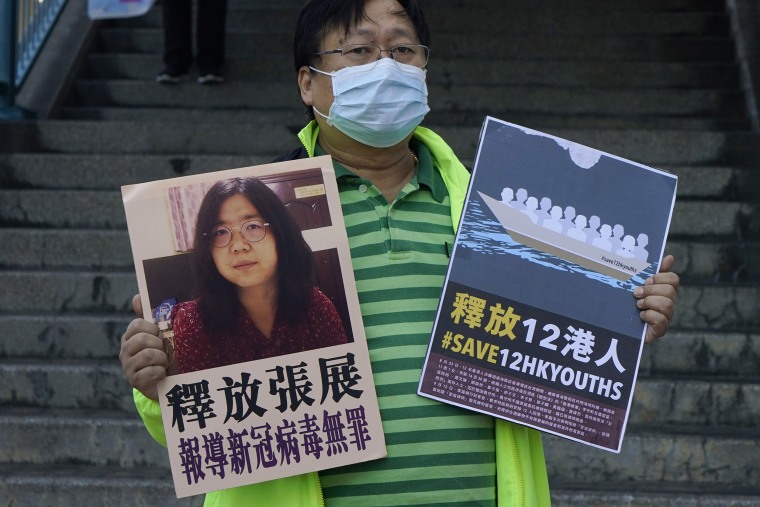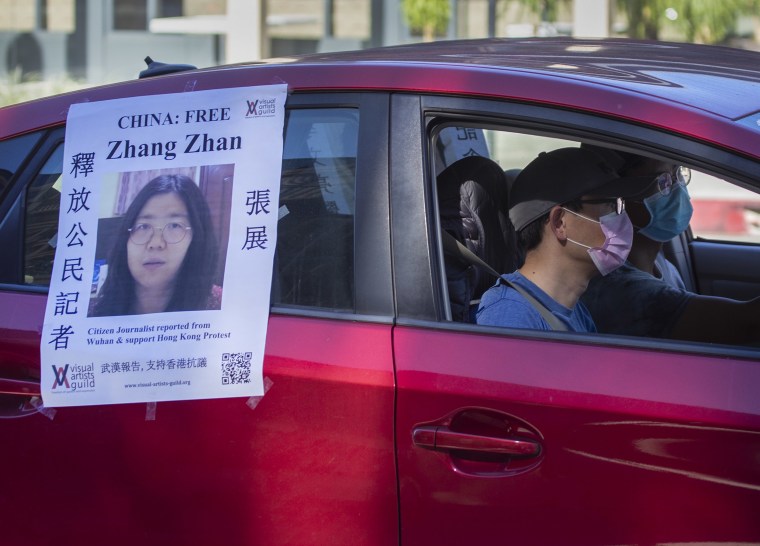Wuhan, COVID-19 : What Is Beijing So Anxious to Hide?
"[Zhang's case] raises serious concerns about media freedom in China [a British diplomat attempted to attend her trial but was not allowed access].""[Zhang] is one of at least 47 journalists currently in detention in China. The whereabouts of other citizen journalists -- including Chen Qiushi and Fang Bin -- is unknown.""[China should] release all those detained for their reporting."British Embassy, BeijingZhang suffered from dizziness and headaches, and was “physically fragile.”“When I met her days ago, her hands were tied to the waist and a nasogastric tube was inserted in her nose."Zhang Keke, Zhang lawyer"She said when I visited her [last week], 'If they give me a heavy sentence then I will refuse food until the very end'.""She thinks she will die in prison.""It's an extreme method of protesting against this society and this environment."Ren Quanniu, Zhang lawyer
 |
"We raised her case with the authorities throughout 2020 as an example of the excessive clampdown on freedom of expression linked to COVID-19, and continue to call for her release."United Nations human rights office
During December Chinese authorities have detained more activists and journalists "without providing any credible information to suggest that these individuals have committed legally recognizable offences", according to Human Rights Watch. They are, without exception, as far as Beijing is concerned, guilty as charged. Charged with whatever crime comes handily to mind. Guilty of reporting the Chinese Communist Party's penchant for silencing critics and putting a firm hold on reporting realities on the ground in China the authorities wish to keep under wraps.
Withholding news and information valuable to the public at large is one of the ways that the ruling CCP is able to retain firm control of the county; what the population doesn't know cannot arouse them to protest, inconveniencing the government authorities who hold the key to news dissemination and who determine what is newsworthy and what is not. News, for example, of a new respiratory malady and serious cases of a pneumonia-like illness that mysteriously took peoples' lives, obviously one of those items to be withheld from public view.
Citizen-journalist Zhang Zhan, 37, saw fit to disseminate news she felt would be of interest to people and whom she felt should have access to the news, since it impinged directly on their future well-being. Government secrecy doesn't sit too well in the opinion of those dedicated to showcasing news being withheld by government auspices. And so a jail sentence of four years was in order for Zhang Zhan for her outrageous impudence in thinking she was above the 'law'. And the law was that no news was to be reported out of Wuhan in 2020.
Yet the intrepid reporter took it upon herself to file a searing series of uncensored reports of the early stages of the novel coronavirus puzzling area doctors and then frightening them to the extent that they took to surreptitiously sending out heads-ups to their colleagues. At the present time, though a young woman, Ms. Zhang's health is not too robust; she gets about in a wheelchair. It's the result of being force-fed throughout her hunger strike from June to the present.
 |
Detained in May, she began her hunger strike in late June and since then has been subjected to force-feeding through a nasal tube. Arms pinned back to her sides so she is unable to pull the feeding tube out, according to her lawyers. Found guilty of 'picking quarrels and provoking trouble' at the conclusion of a brief hearing. She has a law degree though she is not practising at present. She decided to travel from Shanghai to Wuhan in early February, curious to see for herself what was happening there.
After which, what was happening was being chronicled with the aim of informing the public of the chaos she discovered in the early stages of the contamination and what life was like for Wuhan residents. She posted her reports and livestreamed on WeChat, Facebook and Twitter. Evidence of crematoriums operating at midnight in a desperate effort to keep up with the dying was one item she thought worthy of reaching the public.
She thought it important to report on the harassment by authorities of family members of victims. And the detention of other citizen journalists. And then she disappeared herself, in mid-May. She must have known this would be inevitable. A determined, courageous young woman who would not be told what she could and should not report. Seeing it as her duty to the public to inform them. Herself outraged by the stealth and secrecy and incompetence.
Several Wuhan doctors had been punished by authorities for revealing what they witnessed in their hospitals. They were "rumour mongering", according to authorities. And had to recant. But they alerted friends and colleagues of a mysterious pneumonia that had begun circulating in the city. One such doctor, Li Wenliang, died of COVID-19, and became a celebrated hero, a face and a name around which citizens could gather their outrage.
 |
Labels: COVID-19, Reporting, Repression, Wuhan City, Zhang Zhan

<< Home